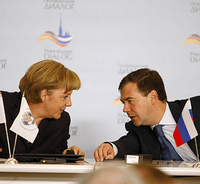Germany's policy of engagement and partnership with Russia is rooted in the German experience within Europe. If economic interdependence and integration could transform Germany after both World War II and the Cold War, so German thinking goes, then it might also transform Russia. Nevertheless, nearly 20 years after the end of the Cold War, Germany's efforts -- as well as those of Europe and the U.S. -- to transform and integrate Russia have failed. Over the past decade, Vladimir Putin's Russia has forcefully rejected integration with the West, predicating its desire for a return to great power status on expanded state power and the assertion of Russian autonomy. But despite Russia's recent shift away from democracy, human rights, and the rule of law, Germany has not only firmly maintained its approach, it has expanded it, leaving the U.S. and Europe divided on this increasingly urgent policy front. Germany has been slow to come to grips with the clear and obvious failings of its Russia policy, which lie not in the concept underlying engagement, but in Germany's inability to achieve its objectives singlehandedly. Germany is not strong enough on its own to change Russia. It is, however, strong enough to change and unify Europe -- and a united Europe could be strong enough to, in turn, spur Russia to change itself.
Germany’s Russia Moment

